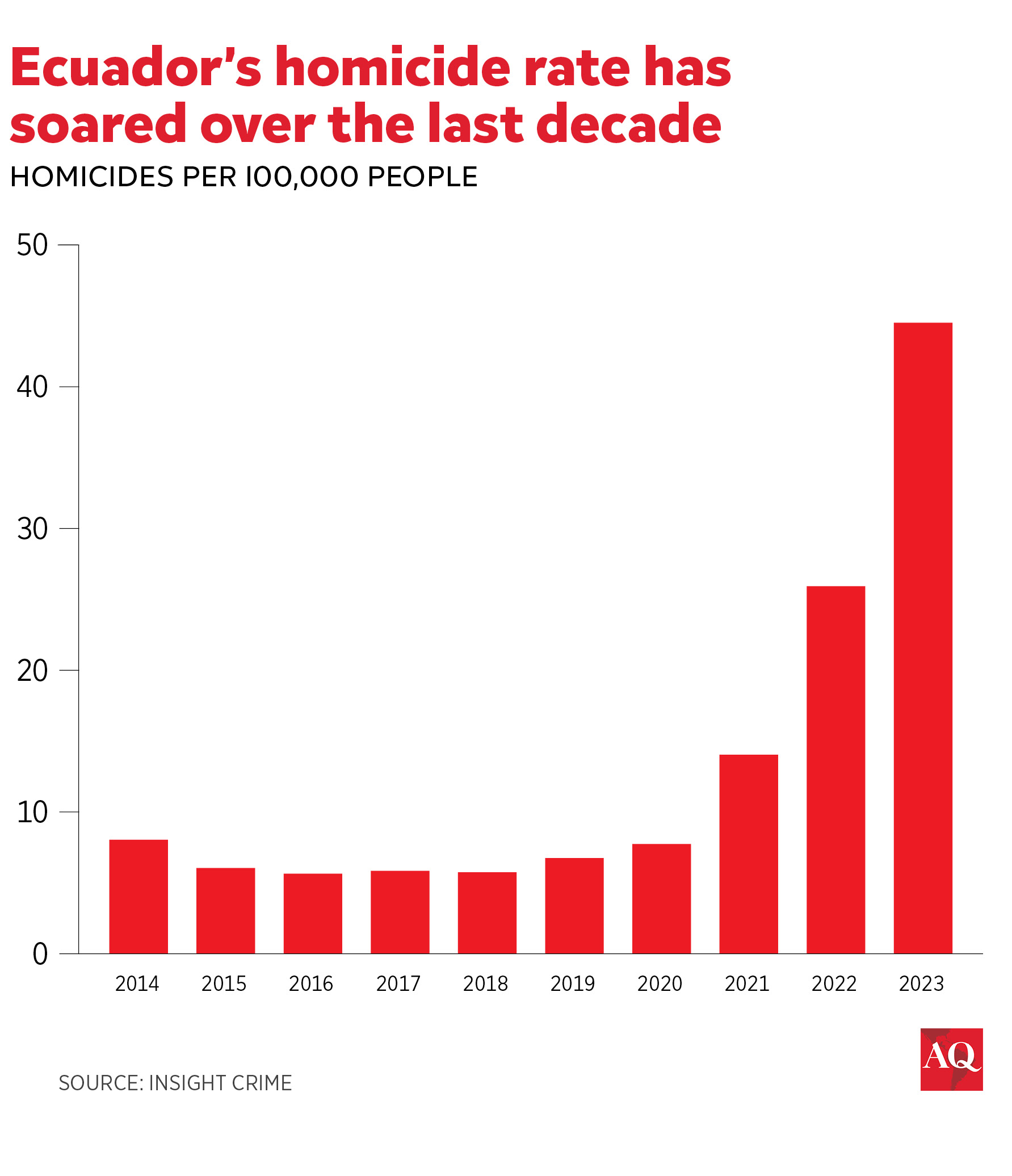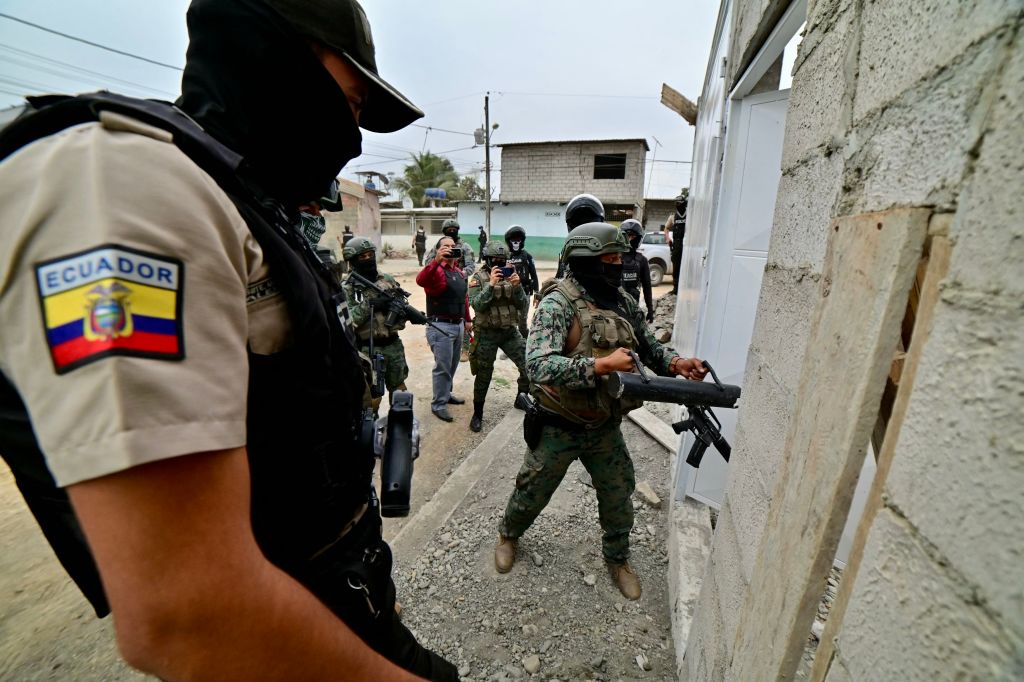Ecuador’s crisis of violence is at an alarming level: The country’s homicide rate has risen 430% in five years, as organized crime groups extort entire neighborhoods, recruit children, kill judges, prosecutors and political candidates, and infiltrate government institutions.
While Daniel Noboa’s government has had some success bringing the murder rate down, it hasn’t done the less glamorous work of shoring up the country’s weak justice system to fight criminals in accordance with the law. This, rather than bellicose rhetoric and shows of force that threaten human rights, should be the priority moving forward. There’s much that Noboa, or whoever wins next month’s election, can do.
The Attorney General’s Office needs an investigative body to keep it from having to rely on police investigators, prosecutors and judges need basic security measures, and the government needs to integrate its crime-fighting efforts better with the justice system. Common-sense measures like these could make a real difference in Ecuador’s fight against organized crime, while protecting everyday Ecuadorians’ rights.
Into the abyss
Shortly after Noboa took office a year ago, organized crime groups took over a state-owned TV station and the leader of a prominent criminal group escaped from prison. Noboa responded by announcing that the country was in an “armed conflict,” suspending some basic constitutional rights, and deploying the military to fight organized crime in the streets and control the prisons.
The government reports that the homicide rate decreased roughly 17 percent compared to 2023, but even government figures show an increase in extortion and kidnappings compared to 2023. Organized crime experts and prosecutors told me during my visit in November that while organized groups are more fragmented, their leaders, territorial control, and illicit economies remain largely untouched.
Noboa has not done enough to strengthen the country’s weak justice system, plagued by allegations of corruption and improper pressure on courts. Prosecutors and judges told me, one after the other, that they didn’t feel safe and lacked basic support and tools to do their job.
At the same time, there are increased reports of human rights violations by security forces. Prosecutors are investigating more than 200 allegations of excessive use of force, 80 reports of torture, 8 of forced disappearances and 15 of extrajudicial executions by security forces since January—a clear uptick compared to 2023. In December, four children disappeared in Guayaquil and were later found dead after being apprehended by military personnel. Meanwhile, the government has branded critics “unpatriotic” or defenders of criminals.

Noboa has touted a security plan called “Plan Fénix,” as a solution to organized crime. But the prosecutors and security experts with whom I spoke don’t see a workable, concrete strategy. Constitutional Court judges have repeatedly found Noboa’s “armed conflict” announcement unconstitutional because the government has failed to provide evidence to back it. Prosecutors told me that they were not aware of the content of “Plan Fénix” or whether it changes the way they investigate organized crime.
A vulnerable justice system
Meanwhile, at least 15 judges and prosecutors have been killed since 2022. Yet even in some of the most dangerous provinces, many prosecutors and judges, including those at risk, lack basic security, such as bulletproof vehicles, to enable them to travel between courtrooms and their offices. In a province heavily impacted by violence, I was surprised that I could walk, without being stopped or questioned, directly to the office of a high-ranking prosecutor in charge of investigating organized crime and other sensitive cases.
Courts and prosecutors’ offices remain severely understaffed. Officials with the Attorney General’s Office told us they have 600 vacant positions, including prosecutors and assistants, in part due to lack of funding. The National Court of Justice, the highest appeals court, has fewer than half the magistrates it requires.
Some provinces don’t even have enough personnel to remove dead bodies from a crime scene or to conduct a ballistics analysis. Investigators in Guayaquil, Ecuador’s largest city and a hotspot for organized crime, told us that they must send forensic materials to the capital, Quito, for testing, which delays investigations.
Prosecutors and judges say there isn’t enough coordination with the police and other institutions to ensure effective investigations into organized crime groups. Given these weaknesses in the criminal justice system, it is unsurprising that organized crime groups feel they can operate with impunity. A lawyer who represents clients accused of money laundering told us that his job is “easy” given how many mistakes understaffed and poorly trained prosecutors and judges make in criminal proceedings.
A prison system in crisis
The prison system remains in crisis. Prison experts and human rights lawyers told me that soldiers deployed there have increasingly been involved in corruption and human rights abuses, including torture. Criminal groups still use prisons to extort and recruit other detainees. Lack of adequate control over prisons has enabled criminal groups to kill hundreds in a string of massacres.
Tackling the crisis
Of course, these are long-lasting problems that won’t be fixed overnight. But there are concrete steps that can be taken. Noboa’s administration, or its successor, should re-establish the Ministry of Justice, a key entity to coordinate criminal policy with the Attorney General’s Office, law enforcement and the prison system, closed in 2018. Drawing lessons from Colombia and other countries in the region, the president should work with the Legislative Assembly to create an investigative body at the Attorney General’s Office, so that prosecutors do not have to rely on often overwhelmed and at times poorly trained police officers to investigate crimes.
When they appoint a new Attorney General late this year, Ecuadorian authorities should elect a candidate with serious plans to improve protection for prosecutors and prioritize investigating high-level corruption and money laundering.
The government should also re-establish drug regulations abrogated in 2023 that made it easier for prosecutors to prioritize strategic, high-level investigations, instead of overburdening the justice system with low-level drug possession cases. Fewer delays in awarding legally provided reductions in sentences for good behavior would make Ecuadorian prisons less crowded.
The crisis in Ecuador still needs urgent and effective action. Deploying the military is not the right response. Having effective and rights-respecting security policies is possible, but it demands focusing resources and efforts to increase the capacity to effectively administer justice.
Goebertus is the Americas Director at Human Rights Watch.





